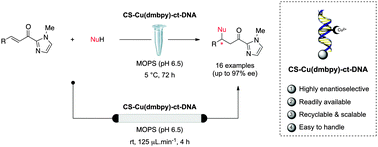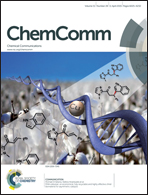DNA-cellulose: an economical, fully recyclable and highly effective chiral biomaterial for asymmetric catalysis†
Abstract
The challenge in DNA-based asymmetric catalysis is to perform a reaction in the vicinity of the helix by incorporating a small-molecule catalyst anchored to the DNA in a covalent, dative, or non-covalent yet stable fashion in order to ensure high levels of enantio-discrimination. Here, we report the first generation of a DNA-based catalyst bound to a cellulose matrix. The chiral biomaterial is commercially available, trivial to use, fully recyclable and produces high levels of enantioselectivity in various Cu(II)-catalyzed asymmetric reactions including Friedel–Crafts alkylations and Michael additions. A single-pass, continuous-flow process is also reported affording fast conversions and high enantioselectivities at low catalyst loadings thus offering a new benchmark in the field of DNA-based asymmetric catalysis.


 Please wait while we load your content...
Please wait while we load your content...